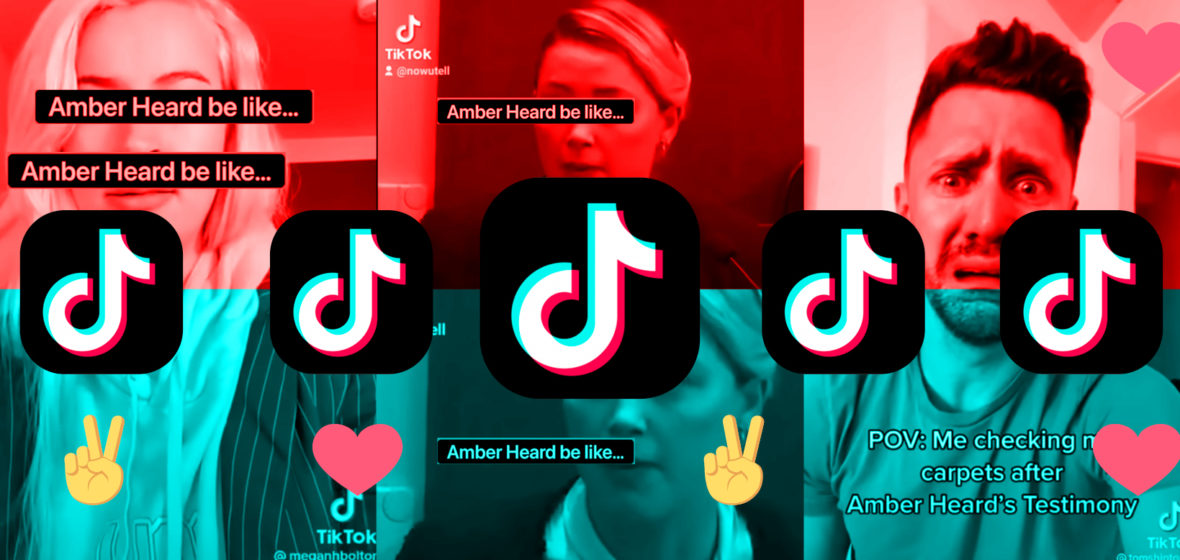The highly publicised and controversial defamation case between actor Johnny Depp and his ex-wife Amber Heard has become a viral phenomenon with millions dissecting the case online.
People around the world have taken to the social media application Tik Tok to share footage, edited videos and re-enactments of the case. But due to the sensitive nature of the trial, Tik Tok has removed some videos for violating its anti-bullying policies. However, thousands remain, igniting fresh concerns that social media is affecting the integrity of the court process.
This case is playing out on social media on an international scale that has not been seen before. Recently, unfounded claims that Heard took a “bump of cocaine” while on the stand and stole dialogue from The Talented Mr Ripley have spread like wildfire on the internet.
Depp is suing his ex-wife Heard in Virginia for defaming him in an opinion piece she wrote for the Washington Post in 2018. In the article, Heard refers to herself as a “public figure representing domestic abuse” without specifically naming the Pirates of the Caribbean star.
Depp previously brought a libel action against The Sun in the UK after the paper alleged he was a “wife beater.” However, in that case, the judge found the article was “substantially true.” Heard cannot use that decision as truth of the fact that Depp assaulted her in this case.
David Rolph, Professor at the University of Sydney Law School and media law expert spoke to LSJ about the cultural currency that surrounds high profile defamation cases.
“Defamation proceedings can have a bit of theatre and circus about them, but they can also become cultural artefacts themselves that cross over into social media spaces and become the subject of discussion, critique and satire,” said Rolph.
“The principle of open justice applies to all proceedings. When suing for defamation, parties need to be aware that courts are open to the public and that a consequence of that is that the media can observe and make fair and accurate reports,” he said.
Rolph highlighted the irony that suing for defamation forms part of your reputation. It is not a static interest but rather a “dynamic interest that changes over time”.
“Suing for defamation, carries the risk that whatever you thought was injurious or humiliating and your reaction to it, then becomes part of your reputation,” said Rolph.
In this case, the jury is made up of seven jurors and four alternates. This differs in Australia where only four people are selected for a defamation jury. Jurors are instructed not to research the case or look at any outside material but it is a more difficult ask in this case due to the intense global interest online.
“If we’re going to have jurors in these types of cases, then we’re going to have to trust that they will by and large comply with the directions that they’re given by judges,” said Rolph.
“Defamation proceedings can have a bit of theatre and circus about them, but they can also become cultural artefacts themselves that cross over into social media spaces and become the subject of discussion, critique and satire.”
David Rolph, Professor at the University of Sydney Law School
Since the landmark decision in the case of the New York Times Co. v Sullivan, United States defamation laws have been more protective of freedom of speech than any other liberal democracy. In that case, the court held that the first amendment protects newspapers even when they print false statements, as long as the newspapers did not act with actual malice.
“It’s not impossible to sue for defamation in the United States but it’s much more difficult, particularly for public figures,” said Rolph.
“Johnny Depp has to prove that Amber Heard published false material and that she published with actual malice or was recklessly indifferent to the truth or falsity of what was being published,” he said.
“The decision to sue Amber and not the Washington Post is obviously intended to get around having to prove actual malice on the part of the newspaper.
“Amber is merely a contributor and not an employee, so the newspaper is not going to be vicariously liable for what she publishes.”
Jake Blundell, Senior Associate at Banki Haddock Fiora specialising in defamation law noted that it is much harder to win a defamation case in America.
“In Australia, all you need to show is that there was a publication, you were identifiable, that it was defamatory, and it caused serious harm,” said Blundell.
“Australia is the world capital for defamation litigation.
“In America, you must prove actual malice. It is difficult to prove as a matter of fact the state of mind – that the person knew they were telling lies.”
Another key difference is that America has a single publication rule whereas Australia has a multiple publication rule. This dictates where publication occurs and where a claim can be brought.
“In the US case, publication occurs where the servers are located and the newspaper is printed in Fairfax, Virginia, so that’s the connection to Virginia,” said Blundell.
“In Australia, publication occurs where the article or matter is downloaded in comprehensible form.”
Depp is seeking $70 million in damages while Heard is countersuing for $140 million. The quantifiability of these damages raises the age-old struggle for the courts in defamation – what is the value of a reputation?
“It’s really hard to put your finger on it,” said Blundell.
“There’s old case law that talks about reputation being a person’s most valuable thing.”
Blundell questioned the comparative value of a reputation in the age of social media and fast-moving news.
“Personally, I’m not sure that we shouldn’t look at those old cases with a more critical eye in the context of how quickly social media moves and the 24-hour news cycle.”




